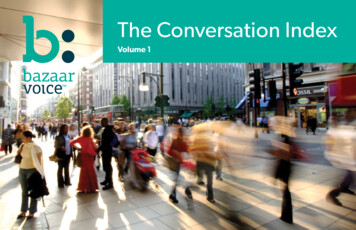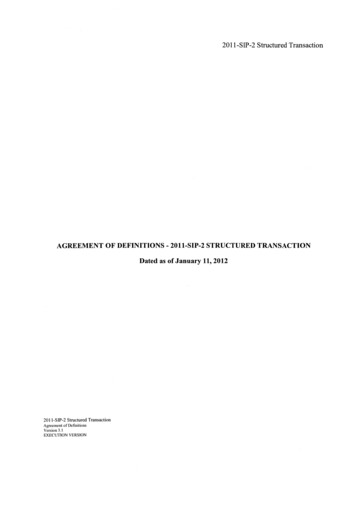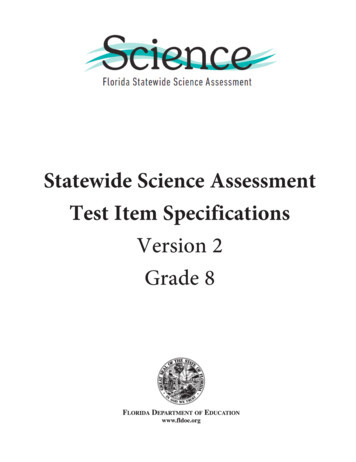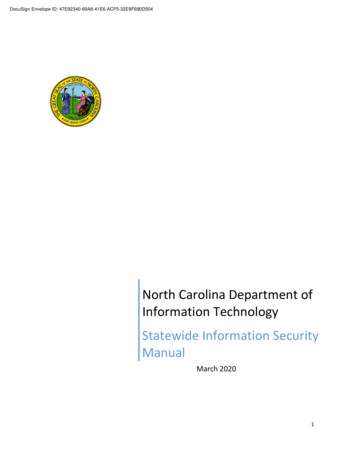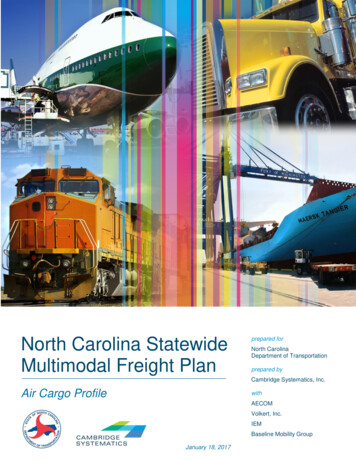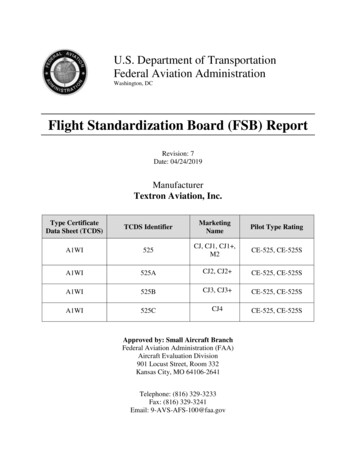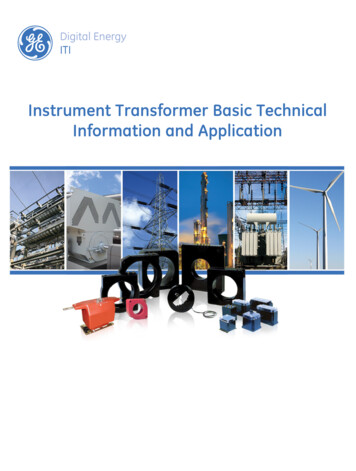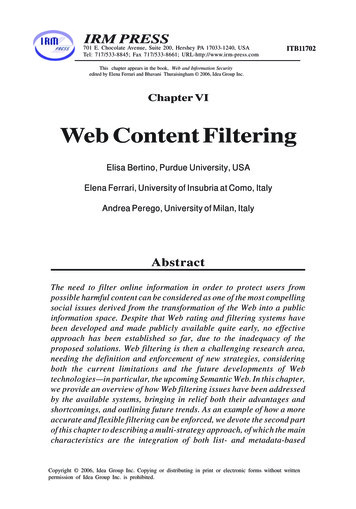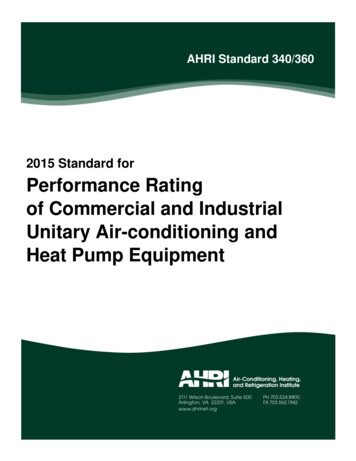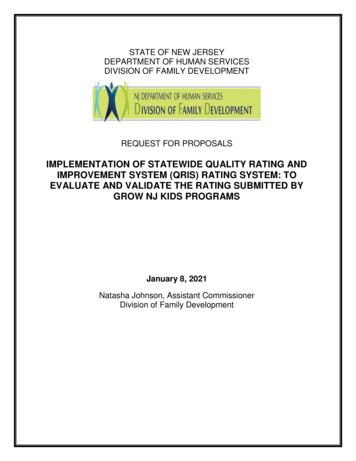
Transcription
STATE OF NEW JERSEYDEPARTMENT OF HUMAN SERVICESDIVISION OF FAMILY DEVELOPMENTREQUEST FOR PROPOSALSIMPLEMENTATION OF STATEWIDE QUALITY RATING ANDIMPROVEMENT SYSTEM (QRIS) RATING SYSTEM: TOEVALUATE AND VALIDATE THE RATING SUBMITTED BYGROW NJ KIDS PROGRAMSJanuary 8, 2021Natasha Johnson, Assistant CommissionerDivision of Family Development
TABLE OF CONTENTSI.Purpose and Intent . 3II.Funding and Contract Term . 4III.Background and Population to be Served . 4IV.Eligible Applicants . 5V.Contract Scope of Work . 5VI.RFP Schedule . 6VII.Required Proposal Content . 6VIII.Appendices . 11IX.General Contracting Information . 11X.Mandatory Bidders Conference . 15XI.Submission of Proposal Requirements . 16XII.Review of Proposals . 17XIII.Appeal of Award Decisions . 17XIV.Post Award Required Documentation . 18XV.Attachments . 19Attachment A – Proposal Cover Sheet. 20Attachment B – Addendum to RFP for Social Service and Training Contracts . 21Attachment C – Statement of Assurances . 23Attachment D – Certification Regarding Debarment, Suspension, Ineligibility and VoluntaryExclusion Lower Tier Covered Transactions. 252
I.Purpose and IntentThe New Jersey Department of Human Services (DHS), Division of FamilyDevelopment (DFD), provides resources and supports to address the child care needsof families and support providers and programs servicing families that need early careand education services.New Jersey’s Child Care Development Block Grant (CCDBG) state plan focuses onhigh quality early care and education. By participating in Grow NJ Kids, New Jersey’sQuality Rating and Improvement System (QRIS), programs receive resources whichinclude training and technical assistance to create a stronger infrastructure to supportand sustain high quality services regardless of the setting. A high quality early careenvironment supports the child in their development by providing a safe, nurturing, andinteractive space in which the child feels secure. Quality early care and education is avital component of New Jersey’s plan to support working families. The State planemphasizes the importance of broadening the awareness of the components of highquality early care and education by helping to benchmark quality indicators forfamilies/caregivers. Essential to the process of elevating quality, is a rating system thatincludes a robust set of measures for validity and reliability. Funds will support a ratingentity (Rating Entity) which consists of a cadre of independent raters to evaluate andvalidate the ratings submitted by Grow NJ Kids programs.DHS/DFD is issuing this Request for Proposal (this RFP) for the purpose of awardingone contract for the provision of a Rating Entity, to support the early care and educationprograms participating in Grow NJ Kids. The focus of this RFP is to provide acomprehensive, rigorous rating and monitoring process for systemic and unbiasedobservations of programs enrolled in Grow NJ Kids.For purposes of this RFP, the term “Program” refers to child care centers, HeadStart/Early Head Start, preschool programs, and family child care providers enrolled inGrow NJ Kids.The overall goal of this RFP is to implement a statewide Rating System, with the RatingEntity as a partner, to support the implementation of Grow NJ Kids. Grow NJ Kids is acritical component of New Jersey’s Early Care and Education System designed toincrease the quality of the early care and education system for all children in NewJersey and to communicate effectively to families/caregivers regarding the services theirchildren are receiving. The Rating Entity must have a presence in New Jersey andwilling to travel statewide. The Rating Entity must have adequate and qualified staff tomeet the needs and goals of this RFP. The Rating Entity staff members will work withGrow NJ Kids Programs across all sectors of early care and education (i.e. Family ChildCare, Head Start, Child Care, District funded Preschool) to provide comprehensive,rigorous rating and monitoring process for systemic and unbiased observations ofprograms.3
The rating process outlined in this RFP was in place prior to March 2020. Due to theongoing COVID-19 pandemic, certain activities outlined in this RFP might need to beadjusted to ensure compliance with the ongoing Health and Safety COVID-19 Guidancefrom the Department of Children and Families (DCF), Department of Health (DOH)and/or the Centers for Disease Control and Prevention (CDC).In addition to conducting ratings, the project entails coordination and collaboration withother key stakeholders, as well as identifying and sharing research-based promisingpractices to address early childhood-related, cross-sector system issues and to identifyknowledge gaps and best practices.II.Funding and Contract TermFunding in the amount of one million dollars ( 1,000,000) is being made availablethrough DHS/DFD for this RFP. Continued funding for the contract(s) resulting from thisRFP, is subject to the availability of State and Federal (if applicable) funding. Contractawards may be subject to upward or downward adjustment based on funding, need,performance and/or other factors.The initial contract period is for one (1) year, with the ability to extend annually for up to4 years. The actual contract beginning and end dates are contingent upon the contractbeing fully executed and signed by all appropriate parties (DHS/DFD and the successfulbidder(s)). The DHS/DFD reserves the right not to issue a contract for a second yearunder certain circumstances, such as, but not limited to, the unsatisfactory work of theselected vendor, failure to meet agreed upon minimum standards, or the failure tosubmit required documentation within requested timeframes.A bidder will submit a proposal for statewide services. No funding match is required,however bidders will need to identify any other sources of funding, both in-kind andmonetary, that will be used. Bidders may not fund any costs incurred for the planning orpreparing a proposal in response to this RFP from current DHS/DFD contracts. Minimalstart-up costs may be considered.III.Background and Population to be ServedIn April 2013, DHS in partnership with other state agencies Department of Education(DOE), Children and Families (DCF), and Health (DOH)), conducted a pilot of qualityrating and improvement system called Grow NJ Kids in four New Jersey counties,serving approximately fifty-seven (57) early childhood programs. In January 2014, NewJersey was awarded the Race to the Top Early Learning Challenge (RTT-ELC). DOEwas the lead department for the grant, but all four state departments mentioned abovewere partners. The RTT-ELC award allowed New Jersey to expand Grow NJ Kidsstatewide. To support the expansion of Grow NJ Kids, and to ensure sustainability ofthe rating process as the RTT-ELC grant concluded, DHS/DFD through the support ofChild Care Development Block Grant will be supporting an entity to rate the Grow NJKids Programs.4
The quality rating process typically occurs 18-24 months after a Program has enrolled inGrow NJ Kids. The time period between enrollment in Grow NJ Kids and ratingdepends on the Program type. Grow NJ Kids programs apply for a rating once theyhave conducted self-assessments and made sustainable improvements to theirprogram to increase its quality based on quality standards. During the rating process,on site observations using the Environment Rating Scales (ERSs) are used todetermine to measure interactions and environments of the program classroom andpractices. The version of the tool used is determined by Program type and age group.The Early Childhood Environment Rating Scale-3 (ECERS-3) and Infant ToddlerEnvironment Rating Scale-3 (ITERS-3) are used in all Program types excluding FamilyChild Care and will occur in 50% of the classrooms, in each age group, as appropriate.For Family Child Care Providers, the Family Child Care Environment Rating ScaleRevision (FCCERS-R) is currently used, with an updated version released in late 2019.A transition plan to introduce the new tool will be developed over the course of the nextyear.As previously noted, The rating process outlined in this RFP was in place prior to March2020. Due to the COVID-19 pandemic, some changes to the rating process may needto be updated for onsite observations based on guidance from DCF, DOH, and/or CDC.IV.Eligible ApplicantsThe bidder may be a non-profit or for-profit entity or governmental entity and subject toconditions outlined in General Contracting provisions on Page 17 of this RFP.V.Contract Scope of WorkThe rating process focuses on the following Grow NJ Kids’ categories:1. Safe and Healthy Learning Environment2. Curriculum and Learning Environment3. Family and Community Engagement4. Workforce/Professional Development5. Program Administration and ManagementRating visits will be conducted onsite, unless otherwise directed by DHS/DFD inaccordance with COVID-19 public health guidance, at Grow NJ Kids Programs anddocumented on follow-up rating summary reports.The Rating Entity will utilize NJCCIS (New Jersey Child Care Information System) tocommunicate rating summary reports which include Environment Rating Scale scores.As the funding agency, DHS/DFD will have authority over decisions made regarding therating process including but not limited to score thresholds used on assessment tools,rating policies, and report templates.The Selected Bidder(s) will coordinate and collaborate with partners from Child CareResource and Referral Agencies (CCR&Rs), Grow NJ Kids Regional Technical5
Assistance Centers, school districts, Grow NJ Kids Training Services, Head Start,Montclair University, and other key quality partner entities as deemed appropriate.Grow NJ Kids includes a robust process for establishing and maintaining inter-raterreliability. Ongoing and in collaboration with DHS/DFD, the successful bidder willdevelop a reliability and inter-rater reliability plan to ensure rater competence with theERS tools for State Anchor Status. Reliability schedule for the ERS tools will beestablished in partnership with DHS/DFD.Orientation of new rating staff will include the process of guided practice, which includeslessons on developmentally appropriate practices, and reviews of completedassessments.Staff who are new to the rating process will complete at least three reliability visits inwhich both they and a State Anchor Rater complete a full assessment.After each reliability visit, new rating staff will debrief and review scoring with the StateAnchor Rater.New rating staff must complete at least three visits in which their assessment scores areat or greater than 90% reliability with the State Anchor Rater.All raters, including State Anchors, are monitored for reliability over time to preventdeviation. Each monitor undergoes a reliability check on an annual basis, and anyscores lower than 85% require additional practice assessments before returning to thefield. This plan of reliability check will be done in partnership with the state.VI.RFP ScheduleThe anticipated time frames (calendar days) for completion of the RFP process are asfollows:DATEJanuary 8, 2021January 29, 2021February 22, 2021May 10, 2021May 18, 2021June 2, 2021VII.DAY12145122130145ACTIONNotice of Funding AvailabilityMandatory Bidders ConferenceDeadline for receipt of proposalsPreliminary award announcementAppeal deadlineFinal award announcementRequired Proposal ContentA. Completed Funding Proposal Cover SheetSee Attachment A.6
B. Bidder’s Organization, History and Experience (15 points)Provide a brief and concise summary of the bidder’s background and experience inimplementing this or related types of services and explain how the bidder is qualifiedto fulfill the obligations of the RFP. The written narrative should: Describe the bidder’s history, mission, purpose, current licenses andmodalities, and record of accomplishments. Explain the work with the targetpopulation and the number of years’ experience working with the targetpopulation; Describe the bidder’s background and experience in implementing this orrelated types of services. Describe why the bidder is the most appropriate andbest qualified to implement this program in the target service area; Summarize the bidder’s administrative and organizational capacity toestablish and implement sound administrative practices and successfullycarry out the proposed program; Describe the bidder's current status and history relative to debarment by anyState, Federal or local government agency. If there is debarment activity, itmust be explained with supporting documentation as an appendix to thebidder's proposal; Provide a description of all active litigation in which the bidder is involved,including pending litigation of which the bidder has received notice. Failure todisclose active or pending litigation may result in the agency being ineligiblefor contract award at DFD’s sole discretion. Include a description of the bidder’s ability to provide culturally competentservices; Describe the bidder’s current status and compliance with contractcommitments in regard to programmatic performance and level of service, ifapplicable.C. Project Description & Narrative (45 points)The successful Bidder will be required to work collaboratively with other TAagencies/organizations and partners of the Grow NJ Kids to leverage resourcesto assist in the implementation of Grow NJ Kids.1. DOE, Division of Early Childhood Education (DECE) provides leadership,resources, and professional learning opportunities that support high-qualityearly childhood and early elementary learning programs. DECE provideguidance and capacity-building for meaningful family engagement in thedevelopmental and learning support for children from birth through thirdgrade. Head Start/Early Head Start is also found in the DECE. The followingcollaboration activities must occur between the selected agency and DECEand Head Start/Early Head Start: Provide ongoing feedback to DECE staff on trends and needsidentified through the rating process for district funded preschoolprograms.7
Attend regular meetings with DECE and district staff/coaches forclarification of rating observations and summaries.2. New Jersey Workforce Registry (New Jersey Child Care InformationSystem) promotes and coordinates systems for the educationaldevelopment of early childhood and primary education, family child care,and afterschool program professionals. NJ Workforce Registry System(NJCCIS) is the data system that collects and stores data related to theearly childhood workforce. The data system will be the mechanism tocollect and track technical assistance data for Grow NJ Kids. The followingcollaboration activities must occur between the successful bidder(s) andNJCCIS: Collaborate with NJCCIS to collect, review and analyze the ratingreports completed by the raters and use the data to develop a plan toaddress identified trends and needs. Rating staff must register in NJCCIS.3. Collaboration with CCR&Rs. The resource and referral agencies are theentities that have been contracted with the state to administer the child caresubsidy program in each county. Bidders will be expected to coordinatewith county Child Care Resource and Referral Agencies around activities forthe Grow NJ Kids Quality Rating Improvement System. The followingcollaboration activities must occur between the selected agency andCCR&Rs: Partner, as needed and appropriate, with resource and referralagencies to outreach to programs on the benefits of participating inGrow NJ Kids.4. Collaboration with Rutgers University, School of Social Work, Institute forFamilies. The training academy created through funding from Race to theTop and supported by the Child Care Development Block Grant, will providetargeted training opportunities that reflect the components of Grow NJ Kids.The following collaboration activities must occur: Collaborate with the training academy to address overall trainingneeds of the programs as identified in trends based on the ratingobservations. Collaborate with training academy to ensure that rating requirementsalign with training offerings.5. Collaboration with Regional Technical Assistance Centers. The TechnicalAssistance Centers are contracted with the state to provide support andstrengthen the quality of Grow NJ Kids programs who serve New Jerseysubsidy programs and providers. Technical assistance is a criticalcomponent of the Grow NJ Kids quality improvement system and a keystrategy to help improve quality in early care programs. The followingcollaboration activities must occur:8
Provide ongoing feedback to Technical Assistance Specialist (TAS)on trends and needs identified through the rating process for GrowNJ Kids programs.Attend regular meetings with TAS for clarification of ratingobservations and summaries.Work with Portfolio Reviewers to complete a final rating summaryreport.D. Outcome(s) and Evaluation (5 points)Provide the following information related to the projected outcomes associated withthe proposal as well any evaluation method that will be utilized to measuresuccesses and/or setbacks associated with this project: The bidder's approach to measurement of consumer satisfaction. The bidder's measurement of the achievement of identified goals andobjectives. The evaluation of contract outcomes. Description of all tools to be used in the evaluation. The bidder will conduct a satisfaction survey of the sites on Grow NJ RatingProcess. The results and plan for improvement will be provided to DHS/DFDas part of the bidder’s Continuous Quality Improvement Plan (CQI).Measures include, but are not limited to:i.Increase in Environmental Rating Scale Scoreii.Curriculum Implementationiii.Programs moving through tiersiv.Increase in the number of credentialed/degreed professionals Tools and activities the bidder will implement to ensure fidelity to theevidence-based practice. To evaluate the effectiveness of the program, ongoing and cyclical evaluationand monitoring of the accomplishment of benchmarks and activities isrequired. Corrections and fine-tuning of the program will be made as needed. The Bidder must obtain prior written approval from DHS/DFD before engagingin any research or evaluation projects that will affect Grow NJ Kids programs.All research projects are subject to DHS/DFD review, policies and proceduresregarding research evaluation. Bidders will be responsible for using the identified Grow NJ Kids DataSystem. Reports will be requested both in paper and electronic form.E. Budget (10 points)Bidders must complete a detailed budget utilizing the DHS/DFD Annex B Exceltemplate. (See Submission of Proposal Package Section). DHS/DFD will considerthe cost efficiency of the proposed budget as it relates to the scope of work. Thebudget should be reasonable and reflect the scope of responsibilities required toaccomplish the goals of this program. All costs associated with the implementationand conducting the program must be clearly delineated and the budget narrative9
notes must clearly articulate all budget items, including a description ofmiscellaneous expenses and other costs.Detailed instructions to complete the Annex B Excel template can be found in theDHS Contract Reimbursement Manual, (CRM) 5.3 Cost-Related Contracts – AnnexB and Annex tandard/anxb instb sec531.pdfBudgets should include the costs for training, if necessary. Please note that trainingcosts must be specifically approved by DHS/DFD. Additionally, all out-of-state travelwill require separate, specific approval from DHS/DFD.F. Personnel and Salaries (20 points)Bidders must determine staff structure to satisfy the contract requirements. Biddersshould describe the proposed staffing structure and identify how many staff will behired to meet the needs of the program. Describe the composition and skill set of the proposed program team,including staff qualifications. Provide details of the Full Time Equivalent (FTE) staffing required to satisfythe contract scope of work. Describe proposed staff qualifications, includingprofessional licensing and related experience. Details should includecurrently on-board or to be hired staff, with details of the recruitment effort.Identify bilingual staff positions (if any). Provide copies of job descriptions or resumes as an appendix – limited to two(2) pages each – for all proposed staff. Identify the number of work hours per week that constitute each FTE in thebidder's proposal. If applicable, define the Part Time Equivalent (PTE) workhours. Description of the proposed organizational structure, including the submissionof an organizational chart as an appendix to the bidder's proposal. The bidder's hiring policies, including background and credential checks, aswell as handling of prior criminal convictions. The approach for supervision of agency staff. A list of the bidder's board members and current term, including eachmember's professional licensure and organizational affiliation(s). The bidder'sproposal must identify each board member who is also an employee of thebidder or an affiliate of the bidder. The proposal shall indicate if the Board ofDirectors vote on contract-related matters. A list of names of consultants the bidder intends to utilize for the contractresulting from this RFP, including each consultant's professional licensureand organizational affiliation(s). Each consultant must be further described asto whether they are also a board member and, if so, whether they are a votingmember. The bidder must identify all reimbursement the consultant receivedas a board member over the last twelve (12) months.10
G. Facilities, Logistics, Equipment (5 points)The bidder should detail its facilities where it’s normal business operations will beperformed and identify equipment and other logistical issues, including at aminimum: A description of the manner in which tangible assets, i.e., computers, phones,other special service equipment, etc., will be acquired and allocated. A description of the bidder's Americans with Disabilities Act (ADA)accessibility to its facilities and/or offices for individuals with disabilities. Proposed location of the program, including office space allocation. Specify ifbidder has site control or ownership of the proposed site. If not, describe howsite will be secured. A list of all costs for materials and supplies necessary to carry of theobjectives of the proposed plan.VIII.AppendicesThe following items must be included as appendices with the bidder's proposal, limitingappendices to a total of 40 pages. Please note that if items 9-12 are not submitted, theproposal will not be considered:1. Bidder mission statement;2. Organizational chart;3. Job descriptions of key personnel;4. Resumes of proposed personnel if on staff, limited to two (2) pages each;5. A description of all pending and in-process audits identifying the requestor, thefirm’s name and telephone number, and the type and scope of the audit;6. List of the board of directors, officers and terms;7. Copy of documentation of the bidder’s charitable registration status;8. Original and/or copies of letters of commitment/support;9. Department of Human Services Statement of Assurances (RFP Attachment C);10. Certification Regarding Debarment, Suspension, Ineligibility and VoluntaryExclusion Lower Tier Covered Transactions (RFP Attachment D);11. Disclosure of Investment in Iran (www.nj.gov/treasury/purchase/forms.shtml);12. Statement of Bidder/Vendor Ownership l).13. Most recent single audit report (A133) or certified statements (submit only two [2]copies); and14. Any other audits performed in the last two (2) years (submit only two [2] copies).IX.General Contracting InformationA. Bidders must currently meet or be able to meet the terms and conditions of theDHS/DFD contract policies and procedures as set forth in the StandardLanguage Document (SLD), the Contract Reimbursement Manual (CRM), andthe Contract Policy and Information Manual (CPIM). These documents are11
available on the DHS website rces/manuals/B. It is the goal DHS/DFD to make the terms of every cost-related contractconcurrent with the Bidder’s fiscal year. Such alignment will facilitate the singleaudit concept, eliminate duplicate expenditure reporting, and establishconsistency with the Bidder’s books, records and annual financial statement.Further clarification can be found in the DHS Contract Policy and InformationManual (CPIM) P1.05, Concurrent Contract Term and Bidder’s Fiscal Year. Thisdocument is available on the DHS website resources/manuals/CPIM/P1.05.pdfC. Bidders are required to comply with the Affirmative Action Requirements ofPublic Law 1975, c. 124 (N.J.A.C. 17:27) and the requirements of the Americanswith Disabilities Act of 1991 (P.L. 101-336).D. DHS is a covered entity pursuant to the Health Insurance Portability andAccountability Act of 1996, 42 U.S.C.A. §1320d et seq. (“HIPAA”); 45 CFR Parts160 and 164. Before Applicant(s) obtains or is permitted to access, create,maintain or store Protected Health Information (“PHI”) as part of its responsibilityunder this contract, the Applicant(s) shall first execute a Business AssociateAgreement (“BAA”). DHS shall have the sole discretion to determine when anApplicant’s work will involve PHI. Protected Health Information shall have thesame meaning as in 45 CFR 160.103.E. Budgets should be reasonable and reflect the scope of responsibilities in order toaccomplish the goals of this program.F. In no event shall DHS/DFD be liable for, or absorb, the Agency (Bidder)’s costsin the preparation of proposal submission (or submissions) in response to theRFP. In addition, funds awarded to a successful Agency (Bidder) may not beused to cover any expenses incurred in the preparation of a response to theRFP.G. The DHS/DFD reserves the right not to issue a contract for a second year, undercertain circumstances, such as, but not limited to: unsatisfactory performance ofthe selected vendor, failure to meet agreed upon standards, or the failure tosubmit required documentation within the requested timeframe.H. The DHS/DFD will own all program information, forms, reports, records,databases, data code, data systems, computer programs, computer software,publications, presentations and/or other reports of work products as defined byDHS/DFD. Further clarification can be found in the DHS Contract Policy andInformation Manual (CPIM) P2.01, Section ources/manuals/CPIM/P2.01.pdf12
I. Funds may only be used to support services that are specific to this award;hence, this funding may not be used to supplant or duplicate existing fundingstreams. Actual funding levels will be contingent upon the availability of fundsand/or the satisfactory performance of the selected bidder.J. In accordance with DHS Policy P1.12, available on the web ces/manuals/CPIM/P1.12.pdfcontracts awarded pursuant to this RFP will be separately clustered until theDHS/DFD determines, in its sole discretion, that the program is stable in terms ofservice provision, expenditures, and applicable revenue generation and theContract Policy and Information Manual (CPIM). These documents are availableon the DHS website resources/manuals/K. Bidders are required to comply with the Affirmative Action Requirements ofPublic Law 1975, c. 124 (N.J.A.C. 17:27) and the requirements of the Americanswith Disabilities Act of 1991 (P.L. 101-336).L. All bidders will be notified in writing of the State’s intent to award a contract. Allproposals are considered public information and will be made available for adefined period after announcement of the contract award and prior to final award,as well as through the State Open Public Records Act process at the conclusionof the RFP process.M. Should service provision be delayed through no fault of the provider, fundingcontinuation will be considered on a case-by-case basis based upon thecircumstances creating the delay. In no case shall the DHS/DFD continuefunding when service commencement commitments are not met, and in no caseshall
The rating process outlined in this RFP was in place prior to March 2020. Due to the ongoing COVID-19 pandemic, certain activities outlined in this RFP might need to be adjusted to ensure compliance with the ongoing Health and Safety COVID-19 Guidance from the Department of Children and Families (DCF), Department of Health (DOH)
